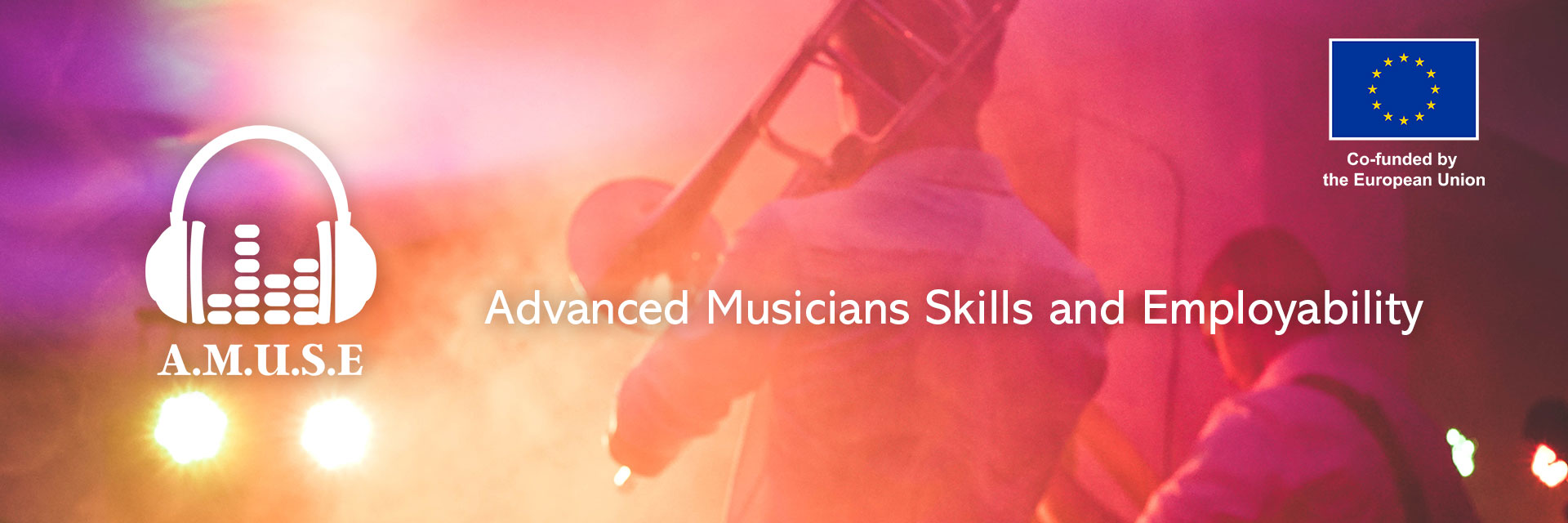
Main outcomes and results
- Set up of multidisciplinary groups including music professionals and workers who converge on the growth of musicians’ integrated skills, known as MUSE. These groups aim to facilitate collaboration and consolidation among diverse professionals in the music industry. An annual context for these groups to meet is the International Piano and Accordion Festival organized by IAC, providing a platform for exchange and cooperation.
- A toolbox with a comprehensive set of skills, integrating professional, transversal, digital, and community-based learning outcomes. This toolbox serves as a valuable resource for individuals looking to develop and enhance their skills in various areas of the music profession.
- The drafting of an education and training toolbox that encompasses a critical selection of learning outcomes based on the “critical needs” identified by the project partners. This set includes study plan pathways that outline the content, methodology, and essential educational resources required for effective learning.
- To ensure the recognition and validation of learning outcomes, the project aims to develop a recognition tools that also value non-formal experiences. This approach acknowledges the diverse learning contexts and experiences of individuals, promoting inclusivity and a comprehensive understanding of their skills and competencies.
- The project entails the development of a set of validated learning outcomes organized within an education curriculum. These learning outcomes are structured around three main areas, accompanied by corresponding methodologies, study plans, and an educational base kit. This comprehensive curriculum serves as a guide for individuals looking to acquire and enhance their skills in the music sector.
- Groups of musicians, music sector workers and professionals, increasing their skills not only expertise in their respective music disciplines but also competencies as trainers’ trainers to effectively transfer their knowledge and skills to others, serving as mentors and facilitators in the learning process.
- Moreover, these groups play a vital role in enhancing their organizations as vocational education and training (VET) providers, particularly in the field of music activities and professions. They contribute to the development and improvement of training programs and courses, ensuring that they meet the needs and demands of the industry. They collaborate to strengthen the capacity of their organizations to provide high-quality education and training opportunities in the music sector.
- Each Partner country aims to organize an event- workshow. Ideally, these events will be connected to their institutional activities , creating a synergistic and integrated experience. The workshows serve as platforms for showcasing the project’s activities and outcomes, providing participants with practical, hands-on learning opportunities.
- During these workshows, music performances can be staged, showcasing the creative and professional scenarios in which they were produced. Excerpts of the event will be diffused through audio or video platforms and application. This allows for wider dissemination of the work and provides insight into the creative process.
- An important objective of the workshows is to generate increased interest in the musician profession and music sector professions. By actively involving attendees and participants in the AMUSE workshops, the project aims to promote and highlight their professional profiles.
- Additionally, through these activities, the project partners will establish “affiliated groups” comprising music practitioners, educators, trainers, and individuals interested in the project’s topics. These groups create a network of like-minded professionals and enthusiasts, facilitating ongoing collaboration and knowledge sharing.
- The drafting of the Integrated Scheme and Handbook serves as a catalyst for fostering multidisciplinary collaboration among the project partners and sector organizations. This collaboration is already in progress, and the handbook provides a unique opportunity to further consolidate and enhance the efforts. By working together on the handbook, the partners can engage in specific VET convergence activities, leveraging their diverse expertise and perspectives.
- The handbook serves as a critical output for the “integrated VET transformation plan”. It has the potential to attract sector operators and workers, not only from within the partnership but also from outside, thereby expanding the reach and impact of the AMUSE network. The comprehensive and practical information contained in the handbook will be valuable to individuals and organizations seeking to improve their understanding of musician and music sector skills.
- Additionally, the handbook serves as a critical output for the “integrated VET transformation plan.” It has the potential to attract sector operators and workers, not only from within the partnership but also from outside, thereby expanding the reach and impact of the AMUSE network. The comprehensive and practical information contained in the handbook will be valuable to individuals and organizations seeking to improve their understanding of musician and music sector skills.

The European Commission support for the production of this publication does not constitute an endorsement of the contents which reflects the views only of the authors, and the Commission cannot be held responsible for any use which may be made of the information contained therein.
